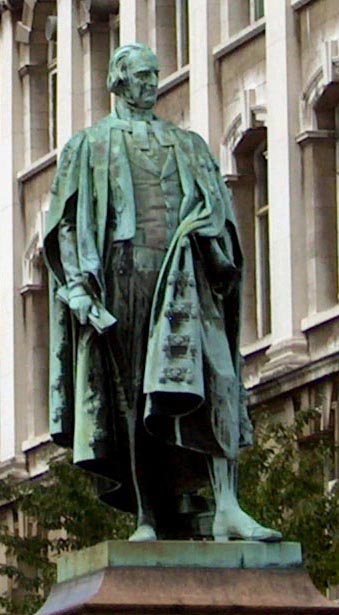Reformed Covenanter
Cancelled Commissioner

In this thread we shall move on to consider whether or not Rev. Dr. Henry Cooke was (as is popular perceived) representative of mainstream Ulster Presbyterians in the early 19th century - in relation to both his Conservative politics and his pan-Protestantism. PB members who have visited Belfast may have had the privilege of seeing the above statue of Cooke which is known as "the black man" (though its now green). However, it is placed in front of the Royal Belfast Academical Institution for a reason. Cooke has his back to RBAI as a sign of disapproval because of the Arianism that was taught there.
There is a popular perception, which is understandable in light of his leading role in the Arian controversy, that Henry Cooke was a figure representative of orthodox Ulster Presbyterianism during this period. However, one shall challenge this perception by arguing that Cooke’s political conservatism and pan-Protestantism was, in fact, idiosyncratic and unrepresentative of the Ulster Presbyterian mainstream.
Because Cooke’s theological conservatism largely reflected that of his colleagues in the Synod of Ulster, it would be easy to jump to the conclusion that the same was also true of his political conservatism. Hence, Cooke has often been credited or blamed with turning Ulster Presbyterians into Tories. Yet this assumption is fundamentally mistaken.
First of all, contrary to popular belief, Cooke himself was not a Tory. Cooke actually said ‘the time was when I would have been a Whig…when Whiggery would have abhorred the serpent of infidelity’; however, Cooke could no longer be a Whig because ‘the foul serpent has coiled itself around Whiggery.’ So Cooke identified himself with an older, non-radical form of Whiggery. Moreover, he explicitly denied that he was a Tory: ‘Neither am I a Tory…have they some things about them, as a political party, which I dare not adopt or approve.’
What then was Cooke’s political philosophy if not modern Whiggery or Toryism? Cooke answered this when he said ‘whilst I reject alike the name of Whig or Tory, I decidedly avow myself a Conservative.’ Cooke may well be described as a Conservative Whig because he was certainly not a reactionary, being in favour of ‘whatever party shall pursue reform without destruction; whatever party shall adopt as its motto “popular liberty” without licentious anarchy.’ That is why Cooke’s biographer J.L. Porter claimed that his political creed was not Toryism, and Cooke’s enemies had ‘fixed upon it that opprobrious name, so as to make it distasteful to Presbyterians.’
However, regardless of whether or not Cooke was a Tory, many of his colleagues, such as John Barnett who had been one of his most ardent supporters in the fight against Arianism, disapproved of his Conservatism and his opposition to the political, ecclesiastical and educational reforms of the Whig government after 1832. When Presbyterians later agitated for tenant rights, Cooke bemoaned the ‘perfect Communist interpretations’ advanced by some ministers. So while Cooke had won the battle against theological radicalism within the Synod, he was evidently not successful in promoting his conservative political views.
With regard to Cooke’s pan-Protestantism, he urged union among evangelical Protestants to combat ‘the priesthood and laity of Rome, the Socinian, and the Infidel.’ Despite the differences between Anglicans and Presbyterians, Cooke believed that the days of bitter conflict between the two sects should be confined to the past, as the days of Laudian Prelacy were long gone.
Cooke saw attempts to disestablish the Church of Ireland as popish attacks upon Protestantism; this culminated in the rather strange spectacle of a Presbyterian minister speaking at Hillsborough in 1834, before Tories and Orangemen, in defence of the Anglican establishment. However, Cooke was not speaking as a representative of the Synod of Ulster, and many of his colleagues bitterly opposed his support for church ascendancy as Ulster Presbyterianism was moving in a more strictly denominational direction. Cooke’s most thorough critic was his ally against Arianism D.G. Brown, who now condemned the ‘monstrous union of presbytery and prelacy’ which Cooke was proposing.
Yet despite his idiosyncrasy, Cooke’s political theory and pan-Protestantism was never officially repudiated by the Synod, which perhaps highlights the political latitudinarianism of Ulster Presbyterianism at the time.

 , but I finally get to use a word my father taught me back when I was learning to read the dictionary: I see that you are an antidisestablishmentarianist!
, but I finally get to use a word my father taught me back when I was learning to read the dictionary: I see that you are an antidisestablishmentarianist! 

 Yet another mess-up; could a moderator please put a question mark on the end of the title of this thread?
Yet another mess-up; could a moderator please put a question mark on the end of the title of this thread? 